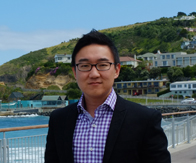Interview - Dr Han Kim

Can you describe your typical day?
A nice thing about radiation oncology is that it is an outpatient driven service. There is a well set out timetable with dedicated time for clinics, radiotherapy planning times (this is like surgeons being in theatre, we do it sitting down with the patients' radiology), acute services (which is like being on call) in our mini ED department for oncology patients. Other days would also involve attending multidisciplinary meetings, x ray conferences, pathology conference, and administration time slots. We usually know what's ahead of the week which is very nice.
What are the types of cases you usually see?
This is where radiation oncology shines! There is a misconception that cancers can only be palliated by the time they arrive at oncology depart. That's far from true! We see patients from those with a new diagnosis with curative treatment options who want to weigh the cons and pros of different treatment modalities, patients may be referred for post op radiation to improve locoregional control, or to someone who has wide spread metastatic cancer who may require palliative radiation to improve their quality of life. In the acute setting we will see someone with spinal cord compression with neurological compromise, bleeding that's not controlled, airway compromise from tumours, etc. We also do offer radiation to certain benign conditions.
What do you like about working in radiation oncology and Auckland region?
This is the department that has given me a true meaning of being a doctor. I truly feel that I can help these patients and most of the patients who come to see us do their best to follow our recommendations. Whether it's for palliation or cure, the benefits that radiation can provide are tremendous. It's one of the departments that has more consultants than registrars so it's very easy to get a good guidance and support.
I like working in Auckland, because of the lifestyle it provides with balance of modern life city life. Close vicinity from beaches, nice restaurants, and vineyards. From department point of view, it is one of the biggest centres in Australasia with large number of radiotherapy treatment machines. We see huge variety of cases meaning the work experience is fantastic and trainees can gain a huge clinical knowledge.
How many teaching hours do you provide to your RMOs each week?
There is a formal journal club attended by RMOs and consultants for 30-45 mins every week, and a dedicated 1 hour teaching time on Thursday afternoons. There are also separate teaching sessions arranged for Phase 1 candidates (pre-Part 1 exam) and Phase 2 candidates (post-Part 1 exam). So it can vary, but minimum 3 hours a week. You also get guidance and informal teaching during clinics and planning sessions.
What opportunities are there for RMO professional development?
As a Radiation oncologist, you need to be able to look after patients who will need to go through curative treatments as well as palliative treatments. You will need to develop your personal skills to manage both scenarios. It would be ideal to provide good insight and hope for patients who can be cured and on the other hand, good care, guidance, and pain relief for patients going through palliative treatment. Palliative care skills are something you will learn through the training and development. As radiation oncology is a rapidly growing field, there are numerous research and clinical trial data being released, you will learn the skills to analyse these carefully, and also develop your skills to design / and participate in research and clinical trials yourself.
What interested you about this specialty?
Fast evolving field with modern technology, extreme satisfaction from work, able to offer lifestyle to accommodate your family and interests as a specialist. I also like the idea of outpatient / clinic driven service, which you can plan ahead.
- Anaesthesia
- Emergency Medicine
- General Practitioners
- Intensive Care Medicine
- Medicine
- Obstetrics and Gynaecology
- Ophthalmology
- Oral Health
- Paediatric Medicine
- Palliative Medicine
- Pathology
- Psychiatry
- Public Health
- Radiology
- Radiation Oncology
- Rehabilitation Medicine
- Sexual Health
- Surgery and Surgical Specialities
- Dermatology
+64 9 631 0707
More contact details: Address RMO Recruitment Contacts
Postal Address
Health New Zealand | Te Whatu OraWorkforce Operations Northern
PO Box 112147,
Auckland 1642, New Zealand
Physical Address
Health New Zealand | Te Whatu OraWorkforce Operations Northern
James Fletcher House, Level 3
Connect Business Park
581-585 Great South Road
Penrose, Auckland 1061
